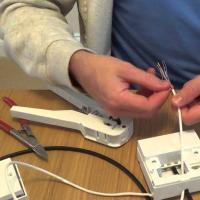Housing and communal services reform: general characteristics, current trends, information support of the reform. Housing and communal services reform: the history of the launch of the program and development trends Housing and communal services reform my house
Housing reform- an automated information system was created by order of the Housing and Public Utilities Reform Assistance Fund, focused on monitoring regional programs for the resettlement of citizens from emergency housing, programs for the overhaul of apartment buildings.
2017: Service for creating a site for the managing organization
In the spring of 2017, a free service appeared in the information system "Housing and Utilities Reform" - the creation of a website for the managing organization. It allows the management company, HOA, ZhSK to create their own website in a few minutes based on the data already entered into the system.
Users will have access to such functions as posting news of the organization, any additional information in the form of text, links, files and images, as well as "feedback" that allows residents to send a message to representatives of the managing organization.
The site address on the Internet is chosen by the administrator of the managing organization independently. In this case, the full address of the organization's website created using this service will look like this: selected_name.reformagkh.ru.
There are two website layout templates available. The use of the third template will be available soon.
The rights to create or delete a site will belong to the administrators and operators of the managing organization.
- Such a service is focused primarily on managing organizations, for which the creation and support of their own Internet resource is an expensive undertaking. In addition, it can be useful for large organizations as a "business card site," said Svetlana Bakuleva, deputy head of the Information Technology Department of the Housing and Public Utilities Reform Assistance Fund.
You can create a website for your managing organization and get acquainted with the capabilities of this service in the workspace of the information system "Housing and Utilities Reform" in the "My Sites" section.
2016: Reform of housing and communal services 2.0
In the course of modernization, a functional block appeared - "Communal Infrastructure", which combines information on projects implemented with the participation of the Fund for the modernization of communal infrastructure systems. The list includes 39 projects in the areas of water disposal, heat supply, water supply, and waste management. The implementation of approved modernization projects will improve the quality and reliability of public services in more than 2,900 settlements, where about 2 million 320 thousand people live.
The "Resettlement of Citizens" block was supplemented with a service for submitting appeals indicating specific shortcomings in the quality of residential premises, as well as appeals for unreliable information on resettlement. The section also contains information about apartment buildings recognized as emergency after 01/01/2012 (list, status of settlement, documents).
A mechanism of logical checks has been launched when saving the card of the corresponding object, which eliminates possible errors and input of distorted data.
Appendix " Housing reform”, developed by BARS Group, a subsidiary of the National Informatization Center of the Rostec Group of Companies, became available on the IOS and Android platforms in March 2017.
The mobile application allows you to get up-to-date information about 1.2 million houses in any city of the Russian Federation. The user will be able to quickly clarify the contacts of the managing organization, see the basic information about the passport of the house (date of commissioning, stage of construction readiness, number of inhabitants, floors, entrances, etc.). The application also contains data on the implementation of the overhaul program in the house (information on the collection of funds from the owners, the year of the last overhaul, the scope of completed and planned work) and data on emergency and under construction houses with information on the progress of resettlement.



The application also allows you to communicate with residents of the house, receive various news using the feed, upload and view photos. The developers of BARS Group made the application interface understandable and convenient, did not overload it with graphic elements, which ensured a quick display of on-screen forms. Navigation elements are designed in a user-friendly form.
2008-2015
In 2008, it became known about the creation of an automated information system [“http://reformagkh.ru Housing and communal services reform”]
The Housing and Public Utilities Reform system was developed by order of the Housing and Public Utilities Fund and is used to monitor regional programs for the resettlement of citizens from dilapidated housing, programs for the overhaul of apartment buildings, information disclosure by organizations managing apartment buildings.
Information on the implementation by the constituent entities of the Russian Federation of regional programs for the overhaul of common property in apartment buildings is posted in the system by authorized representatives of the executive authorities in the field of housing and communal services of the constituent entities of the Russian Federation on the basis of the Order of September 2, 2014 N 520 / pr of the Ministry of Construction and Housing and Communal Services of the Russian Federation " On the forms of monitoring and reporting on the implementation by the constituent entities of the Russian Federation of regional programs for the overhaul of common property in apartment buildings.
System window screenshot (2015)
All data related to the implementation of this program is publicly available on the reformagkh.ru website in the “Major Repairs” section and is displayed in the form in which it was provided by the constituent entities of the Russian Federation.
As of November 24, 2015, 11,000 specialists in more than 5,000 municipalities in 83 constituent entities of the Russian Federation provide data entry and processing in the Fund's information system.
Specialists of the Housing and Communal Services Fund daily provide technical support and advice to all users of the information system as needed. Detailed instructions for using the system have been developed and are available to all its users.
The Fund regularly holds webinars on issues related to work in the AIS “Housing and Public Utilities Reform”, a separate telephone line and e-mail address have been allocated for consultations with employees of the executive authorities of the constituent entities of the Russian Federation and local governments.
The Automated Information System "Housing and Utilities Reform" is a key element of the monitoring system for the implementation of programs for the overhaul of common property in apartment buildings. In order to ensure maximum information transparency, according to the information system “Reform of the housing and communal services”, the Housing and Public Utilities Fund issues a monthly information bulletin on the implementation of regional capital repair programs, which is sent to the media.
- Conditions for the provision of financial support at the expense of the Housing and Utilities Reform Assistance Fund
- Regional targeted program for the overhaul of apartment buildings
- Regional targeted program for the resettlement of citizens from emergency housing stock
- The procedure for making decisions on the suspension of the provision of financial support at the expense of the Fund
The current stage of the housing and communal services reform was "launched" by the Federal Law of July 21, 2007 N 185-FZ "On the Fund for Assistance to the Reform of Housing and Communal Services", which, in order to create safe and favorable living conditions for citizens, improve the quality of reforming the housing and communal services, form effective mechanisms for managing the housing stock, introducing resource-saving technologies, establishes the legal and organizational framework for providing financial support to the constituent entities of the Russian Federation and municipalities for the overhaul of apartment buildings, the resettlement of citizens from emergency housing stock by creating a non-profit organization that performs the functions of providing such financial support, determines competence, the procedure for its creation and activities, regulates relations between the specified non-profit organization, state authorities of the constituent entities of the Russian Federation and local governments.
To achieve these goals, the state created a state corporation - the Fund for Assistance to the Reform of Housing and Communal Services, which performs the following functions on a gratuitous basis:
- considers applications submitted by the constituent entities of the Russian Federation for the provision of financial support at the expense of the Fund;
- decides on the compliance of applications and documents attached to applications with the established requirements;
- decides on the provision of financial support at the expense of the Fund on the basis of applications;
- provides methodological support for the preparation by the constituent entities of the Russian Federation of applications and documents attached to applications;
- monitors the implementation of regional targeted programs for the overhaul of apartment buildings and regional targeted programs for the resettlement of citizens from emergency housing stock, as well as the implementation of the conditions for providing financial support provided for by this Federal Law at the expense of the Fund;
- performs other functions provided for by this Federal Law.
Support funds are allocated to those regions, and then to municipalities, which in fact create a market for housing and communal services. They encourage competition among management companies, support homeowners associations, in general, they comply with the main conditions of the Federal Law of July 21, 2007 N 185-FZ, according to which the housing and communal services of Russia are being reformed.
In accordance with Article 25 of the Federal Law of July 21, 2007 N 185-FZ, the Fund was supposed to operate until January 1, 2012 and be subject to liquidation, however, taking into account the accumulated positive experience of its work, a number of changes were made, providing for the extension of the Fund's validity until January 1, 2026.
In accordance with the changes introduced by Federal Law No. 270-FZ of December 25, 2012, the conditions and procedure for providing financial support at the expense of the Fund are being changed. In particular, the definition of emergency housing stock is specified:
"emergency housing stock - a set of residential premises in multi-apartment buildings, recognized in accordance with the established procedure before January 1, 2012 as emergency and subject to demolition or reconstruction due to physical wear and tear during their operation",
and the conditions for providing financial support at the expense of the Fund for Assistance to the Reform of the Housing and Communal Services include:
- implementation of regional programs for the modernization of communal infrastructure systems;
- implementation of work on the formation and conduct of state cadastral registration of land plots on which apartment buildings are located;
- carrying out activities related to the installation of collective (general house) metering devices for the consumption of resources necessary for the provision of public services;
- carrying out activities related to ensuring the implementation of major repairs of common property in apartment buildings, provided for by housing legislation,
as well as a number of some other measures aimed at improving the quality of reforming the housing and communal services.
Related news
In accordance with paragraph 1 of Articles 44 and 46 of the Housing Code of the Russian Federation, the general meeting of owners of premises in an apartment building is the management body of an apartment building. Decisions of the general meeting of owners of premises in an apartment building are made by a majority vote of the total number of votes participating in this meeting and are drawn up in minutes. The initiator of the meeting can be any owner of the premises ...
In accordance with the Rules for the provision of public services to owners and users of premises in apartment buildings and residential buildings (hereinafter referred to as the Rules), approved by Decree of the Government of the Russian Federation of May 6, 2011 N 354, owners and tenants of residential premises in an apartment building are liable for payment for consumed utilities not only for individual consumption, but also for the consumption of communal resources for general house needs ...
Housing and communal services (HCS) is an important branch of the Russian economy, providing citizens with such an attribute of a stable life as housing with all “amenities”. The housing and communal services sector is one of the pillars on which the effective social policy of the state rests and therefore needs to be timely changed.
The housing and communal services reform was launched at the dawn of the Russian Federation, in 1992, and put into effect by Decree of the President of the Russian Federation No. 425 “On the reform of housing and communal services in the Russian Federation” dated May 27, 1997. Subsequently, many other regulatory legal acts were issued that corrected the concept of reform and introducing new directions into it. After 11 years, in 2018, housing and communal services are still being reformed, which is associated with the complexity and dynamism of the development of this sector of the economy.
Reasons and goals of the housing and communal services reform
The reasons for the reform of housing and communal services include:
- the need to move away from Soviet principles of work;
- building the housing and communal services sector in line with the development of the Russian market economy as a whole;
- inefficient use of resources in the housing sector;
- inability to meet the needs of citizens in the housing and communal services sector.
The reform of housing and communal services should achieve the following goals:
- achieving conformity of living conditions with quality standards;
- reducing the costs of enterprises providing housing and communal services, and for housing and communal services, provided that the quality of the services provided is maintained;
- the transition of the housing and communal services sector to the mode of “self-sufficiency” and the preservation of the purchasing power of housing and communal services.
The reform of housing and communal services is authorized to be carried out by the Government of the Russian Federation.
Main tasks
The authors of the reform propose to create conditions for the demonopolization of the housing and communal services market. This will allow citizens, as consumers of these services, to make a favorable choice for them in favor of one organization or another, and housing and communal services, in turn, will have an incentive to use their available resources efficiently.
There are several ways to develop competition in this area:
- formation by local governments of an order for the provision;
- attraction on equal terms of enterprises of various organizational and legal forms;
- creation of an accounting system for services provided on the basis of .
Modernization of the housing and communal services management system
Since the creation of a competitive environment in the housing and communal services sector implies the emergence of new participants in these relations, it is necessary to rationally change the housing and communal services management system. The participants in relations in the housing and communal services sector, in addition to state authorities and local governments, as well as consumers of housing and communal services (tenants, housing cooperatives and homeowners), include investment, operating and construction organizations of various forms of ownership.
Improving the housing and communal services management system is aimed at increasing the importance of local governments and independent business entities that could not only effectively interact with state authorities, but also develop the housing and communal services facility.
Ensuring state regulation and control
The reform seeks to improve the system of state regulation and control. They are carried out:
- government departments(state housing inspections);
- local authorities.
Here it is expedient to give these entities additional administrative powers and develop a regulatory framework for this.
Encouraging the creation of HOAs
Association in the form of an HOA is an effective way to protect the rights and legitimate interests of homeowners, as well as a real opportunity to independently resolve the issues of their housing and determine the costs for these purposes.
Stages of housing and communal services reform
The implementation of the housing and communal services reform is a long process. It can be divided into several stages:
- 1992-1997– development of a policy in the field of housing and communal services and the concept of reform, the formation of a regulatory legal framework.
- 1997-2003– implementation of Decree of the President of the Russian Federation No. 425 “On the reform of housing and communal services in the Russian Federation” dated May 27, 1997.
- 2003-2004– introduction by the Government of the Russian Federation of federal standards for the transition to new housing and communal services tariffs, consistent with the indicators of the provision of citizens and the country's policy.
- 2007-our time– update of the reform concept (new orders of the President of the Russian Federation, adoption of Federal Law No. 185-FZ of July 21, 2007 “On the Fund for Assistance to the Reform of Housing and Communal Services”).
Actual directions of housing and communal services reform: resettlement of citizens from dilapidated housing

Do not pay fees for major repairs:
- owners of emergency houses or houses subject to demolition;
- owners of land plots subject to withdrawal for state or municipal needs.
For poor citizens, the law provides for the payment of major repairs.
When do they start paying?
As a general rule, the obligation to pay contributions for major repairs arises from the owners 8 months after the approval of the regional program.
If the apartment building was put into operation after the approval of the regional program, then this period is set by the government of the constituent entity of the Russian Federation (it cannot be later than 5 years after the inclusion of the apartment building in the regional program).
How is the fund formed?
Owners can choose 2 ways to form a capital repair fund:
- formation on a special account- the owners themselves organize a major overhaul by choosing a repair contractor and concluding an agreement with him. Overhaul is carried out within the time frame determined by the regional program, or ahead of schedule, if possible.
- formation on the account of the regional operator- the owners send money to the account of the regional operator, where the money of other owners is also located. The regional operator is organizing the repair. He can use the funds of the owners on a repayable basis.
What does a major overhaul include?
Capital repairs provide a certain complex of works and services. These include:
- repair of communication and engineering systems;
- repair or replacement of elevator equipment;
- roof, basement, facade repair;
- building foundation repair.
Information support of the housing and communal services reform
The Internet portal "Housing and Public Utilities Reform" is designed to inform and communicate citizens with government officials and. Through the site you can find:
- basic information about your house (area, date of commissioning, etc.);
- information about the management company and its contacts;
- electronic, where residents have the opportunity to leave their comments about the repair of the house and complaints.
Registration on the portal is a simple process. Worth only:
- go to the site https://www.reformagkh.ru/ ;;
- control over the work of the management company;
- receiving complaints and participating in electronic forums.
Non-disclosure of information by management companies
Housing and communal services reformers are trying to make this area as transparent as possible by creating special websites for citizens and obliging management companies to disclose the necessary information.
According to Government Decree No. 731 of September 27, 2014, each managing organization must create its own website, register on the Housing and Utilities Reform website, and also form an information stand in the office in order to inform citizens about their activities.
What information needs to be disclosed?
The management company must disclose the information specified by Government Decree No. 731. It includes:
- general information about the management company;
- a list of managed houses and information about them;
- information about the work and services provided;
- information on consumption and providers of housing and communal services;
- information on the use of the common property of MKD;
- annual reports, etc.
Responsibility for non-disclosure of information
If the management company does not comply with Government Decree No. 731 and does not disclose the necessary information or does it in an improper form, then it will face a fine in the amount of 50 to 500 thousand rubles, according to Art. Art. 7.23.3 and 14.1.3 of the Administrative Code of the Russian Federation. For a repeated or gross violation, disqualification for a period of 6 months is provided. up to 3 years.
As we can see, the housing and communal services reform is a very large set of measures that affects both public and private relations. The main goal of the reform - to make the housing sector "closer to the people" - has not yet been achieved, but the legislator is on the right track.
By clicking on the send button, you consent to the processing of your personal data.
The housing and communal services sector has been subject to various reforms for decades, but despite all the efforts made to modernize, this sector remains inefficient. Unproductive spending of budgetary funds, the need for working tools for managing the housing stock, state and municipal monopoly, a high share of depreciation of the housing stock became prerequisites for the launch of the Housing Reform program.
Launch of the Housing and Public Utilities Reform Project
The project started in Russia in 2010, when the Government of the Russian Federation and the World Bank signed an agreement on the implementation of the corresponding program.
The implementation of the reform measures is carried out by the Housing and Communal Services Reform Assistance Fund, established on July 21, 2007.
This state corporation is designed to stimulate the formation of effective methods of housing management and the transition to resource-saving technologies.
14 cities participated at the beginning of the project:
ten "main" ones: Bratsk, Volzhsky, Ivanovo, Naberezhnye Chelny, Nefteyugansk, Novokuibyshevsk, Orenburg, Saransk, Tula, Cheboksary;
four "reserve": Arkhangelsk, Dimitrovgrad, Pyatigorsk and Cherepovets.
The project was carried out in two stages:
institutional: carrying out reforms of the housing and communal complex at the expense of its own budget with the technical assistance of experts financed from the project.
Investment: direction of investments in infrastructure facilities of housing and communal services from the project funds, focusing on the investment plans of cities.
Already in the process of implementing the program in all 14 cities, a tangible improvement in the quality of housing and communal services was achieved.
So, for example, in the city of Naberezhnye Chelny, water distribution networks and pressure collectors of two sewage pumping stations were reconstructed. This made it possible to reduce the accident rate of collectors and ensure uninterrupted wastewater disposal of the city..
The project for the reconstruction of heating networks was implemented in the city of Nefteyugansk. Thanks to this, the continuity of the supply of thermal energy has significantly increased by reducing heat losses, reducing the level of leakage and the general accident rate of networks..
Examples of successful renovations can be found in any of the cities listed. The set of measures carried out to a large extent influenced the reform program and the housing and communal services sector in the cities participating in the program:
almost complete liquidation of debts on social payments for housing and communal services;
developed municipal plans for investment in public infrastructure;
the number of apartment buildings serviced by professional management companies has been increased;
Having received positive results and experience gained during the reform, the state is developing this reform in other regions and cities of Russia.
The main directions and prospects of the housing and communal services reform
The project "Housing and Utilities Reform in Russia" is aimed at implementing the following areas:
transition of the communal sector to market relations;
increasing the share of participation of private business;
stimulation of competition;
improving the quality of public services;
liquidation of the formed monopolies in the industry;
renovation of the housing and communal complex;
development of the institution of an effective owner;
overhaul of the housing stock;
introduction and operation of energy efficient technologies;
preservation of the social protection system and support for privileged segments of the population.
In accordance with Decree of the Government of the Russian Federation of August 13, 2006 No. 491 “On approval of the Rules for the maintenance of common property in an apartment building”, an apartment building is the joint property of the owners of premises in it.
It follows from this that the entire house is in the possession of the apartment owners. They are responsible for its condition and are obliged to ensure the overhaul in due time. To exercise these rights, the legislation has endowed the owners with a wide range of powers. But in the process of privatization, a significant part of the housing stock was handed over in a dilapidated form. Consequently, the owners do not have the necessary resources to carry out repairs and the appropriate skills to modernize the residential infrastructure in such a state.
One of the points of this reform, as we mentioned above, is the introduction of market mechanisms in the housing and communal services system. Which should subsequently lead to a transition to 100% payment for housing and communal services. As a result of the reform, citizens' spending on housing and communal services may increase by an average of 20-25%. At the same time, the system of compensation payments will continue to work for socially unprotected categories.
Disclosure Standard
Now any citizen can see information about the activities of his management company and information about a particular house.
This is regulated by Decree of the Government of the Russian Federation of September 23, 2010 N 731, which is required to be carried out by managing organizations operating in the field of managing apartment buildings.
The Standard indicates the types of information about the management of the house, which must be placed in the public domain for residents. It is necessary to ensure the availability and safety of data for 5 years. These include:
basic information about the organization (name, address, legal form, etc.);
a list of houses under management and general information about each of them (address, number of floors, level of amenities, year, etc.);
data on the work performed and the services provided;
information about utilities;
information about the operation of the common property of the house;
information on the overhaul of common property, if the management company is the contractor;
data on general meetings of home owners;
annual reports;
information about verbal reprimands, written orders, fines or disqualifications (if any).
The document also lists the required sources:
official portal Housing and communal services reform;
booth in the office of the company.
In other words, management companies must have a website and be registered on the official website of the Housing Reform project. Failure to comply with these requirements will result in penalties.
Housing reform in Russia is not a new concept, and most Russians have already become familiar with the process of its implementation. But do all citizens know what is behind the concept of "Housing and Public Utilities Reform", how long it will last and what is the ultimate goal of the entire program? We will answer these and many other important questions within the framework of the topic “All about the housing and communal services reform”.
The concept of housing and communal services
It is a complex of enterprises and services for servicing the population of cities, villages, etc.
HCS (Housing and Communal Services) - these are services provided to consumers living in the housing stock in order to ensure comfortable living conditions.
The utilities include:
- Power supply.
- Water supply (hot and cold).
- Water disposal.
- Lift economy.
- Collection, removal and disposal of garbage.
- Heat supply (heating).
- Gas supply.
- Cleaning of common areas.
- Repair of houses (capital and current).
- Repair of engineering communications.
- Maintenance, landscaping and cleaning of adjacent areas.
The composition of public utilities services provided to the consumer depends on the degree of home improvement.
to the menu
Comprehensive Program for the Modernization and Reform of Housing and Public Utilities for 2010-2020
The main goals and directions of this program:
- By 2020, provide residents of apartment buildings with high-quality and affordable public services at the same time.
- To improve competitive relations in the field of management and maintenance of the housing stock, namely, to create associations of homeowners (HOA) and management organizations.
- Transfer subsidies and benefits for payment of housing and communal services into cash.
- Actively implement a system for saving resources and energy. Install metering devices.
Housing reform. general information
The housing and communal services reform is being carried out by the government of the Russian Federation and implies the modernization of the entire housing and communal services of the country.
During the period of economic reforms, the physical depreciation of housing and communal services has reached quite large proportions. Approximate numbers are:
- Public water supply networks - 65%.
- Boiler houses - 55%.
- Thermal networks - 63%.
- Water pumping stations - 65%.
- Electrical networks - 58%.
- Sewerage - 56%.
- Water treatment facilities - 54%.
According to the Housing Code of the Russian Federation and Decree of the Government of the Russian Federation No. 491 dated August 13, 2006, an apartment building is the collective property of all owners of the premises. It turns out that the tenants of the apartments own the house as a whole, and not just their living space. And, therefore, they must be responsible for its condition and carry out major repairs in a timely manner.
The main problem here was that the houses were handed over to the owners in an extremely deplorable state. For the overhaul required huge amounts of money, which the owners did not have. Also, the residents did not have management skills.
The main conductor of the reform was the state corporation - the Fund for Assistance to Housing and Utilities Reform. It was created by the decision of the Government of the Russian Federation of 21.07.2007. 2007. More detailed information concerning the work of the Fund we will place in the second half of the article.
to the menu
Directions for the implementation of the reform
The main directions for the implementation of the housing and communal services reform have been identified:
- Transfer of the public utilities sector to the framework of market relations.
- Attracting private business.
- Ridding the industry of monopolies.
- Stimulation of competition.
- Improving the quality of commercial services.
- Modernization of the housing and communal services complex.
- Formation of the institution of an effective owner.
- Relocation of tenants from emergency housing.
- Carrying out major repairs of apartment buildings.
- Implementation of energy efficient technologies.
- Support for privileged segments of the population, the implementation of social protection.
Fund for Assistance to the Reform of Housing and Communal Services
The State Corporation "Housing and Public Utilities Reform Assistance Fund" is a non-profit organization that creates favorable and safe living conditions for citizens, as well as stimulates the reform of housing and communal services, the formation of effective housing management mechanisms and the introduction of resource-saving technologies by providing financial support at the expense of the Fund.
The initial contribution to the fund's budget in December 2007 amounted to 240 billion rubles. It was carried out at the expense of additional state revenues. Also, 15 billion rubles were allocated in 2010.
In addition, the Housing and Public Utilities Reform Assistance Fund uses income from the placement of temporarily free funds to finance regional programs for major repairs and resettlement of citizens from dilapidated housing stock. More than 11 billion rubles have already been sent to the regions.
Initially, the Reform Assistance Fund was supposed to operate until January 1, 2013, after which it was threatened with liquidation. However, it was decided to extend its activities until 2015. On July 24, 2013, President of the Russian Federation Vladimir Putin signed a law extending the work of the Fund until January 1, 2018.
Functions of the Housing and Public Utilities Reform Assistance Fund:
- Consideration of applications submitted by the constituent entities of the Russian Federation for the provision of financial support at the expense of the Fund,
- Making decisions on compliance with the requirements of applications and documents attached to them in accordance with Federal Law No. 185-FZ.
- Making decisions on the provision of financial support at the expense of the Fund on the basis of applications.
- Implementation of methodological support for the preparation of applications and documents attached to them by the constituent entities of the Russian Federation.
- Monitoring the implementation of regional targeted programs for the overhaul of apartment buildings.
- Implementation of monitoring on the implementation of regional targeted programs for the resettlement of citizens from emergency housing stock.
- Control over the fulfillment of the conditions for the provision of financial support provided for by this Federal Law at the expense of the Fund.
- Implementation of other functions stipulated by the Federal Law of July 21, 2007 No. 185-FZ “On the Fund for Assistance to the Reform of the Housing and Communal Services”.
to the menu
Providing financial support
The Housing and Communal Services Reform Assistance Fund provides financial support for the implementation of regional targeted programs, namely, it allocates funds:
- For major repairs of apartment buildings.
- For the resettlement of citizens from emergency housing, taking into account the need to stimulate the development of the housing market (period: from December 1, 2008 to the end of 2009).
- For the resettlement of citizens from emergency housing.
- For the resettlement of citizens from emergency housing, taking into account the need to stimulate the development of low-rise construction (period: from March 10, 2010 in accordance with Federal Law 25-FZ).
- To provide financial support at the expense of the Fund for the implementation of measures to support single-industry municipalities, considered by the Board of the Fund.
to the menu
Organization of a homeowners association
A homeowners association (HOA) is one of the forms of managing an apartment building. In fact, the HOA is an organization for ensuring the harmonious maintenance of the house. A partnership may include both one house and several quarters.
When joining an HOA, the owner assumes obligations to participate in the life of his home. He is required to attend meetings.
To create a homeowners association, 50% of the votes + at least one vote from above are required. Residents who do not join the HOA are automatically deprived of the right to vote. However, this fact does not relieve them of their obligations to implement the decisions taken at the general meetings of the HOA.
To create an HOA, you must:
- Create an initiative group. As a rule, it includes 5-6 people and a chairman.
- Apply to the district administration with an application, which should indicate the points on providing them with a list of apartments, indicating the area of \u200b\u200beach of them and information about the property, as well as approving the candidacy of the City Representative in the future HOA to participate in the organizational meeting and further work of the partnership. In other paragraphs, you can reflect the wishes of the residents.
- Prepare for the meeting. Prepare and study the charter of the HOA and an exemplary Minutes of the general meeting. Prepare voting sheets to determine the "Agenda". The agenda should include no more than five items.
- Inform all owners of the meeting.
- Hold a general meeting, during which you should choose a method of management (on your own or with the involvement of professionals) and adopt a charter.
- Register an HOA. To do this, you must contact the Office of the Federal Registration Service and present an application for state registration, the original or a certified copy of the minutes of the general meeting, the charter of the partnership in two copies and a receipt for payment of the state duty for registration.
- To carry out the transfer of the house to the management of the HOA. The house is transferred under the act of acceptance and transfer with the application of technical documentation for the building, in accordance with the norms for the technical operation of the housing stock.
to the menu
 How and where to connect your home phone yourself
How and where to connect your home phone yourself Rolsen is the largest electronics manufacturer in Russia
Rolsen is the largest electronics manufacturer in Russia Changes in the tariff "go to zero
Changes in the tariff "go to zero Yota (mobile operator): reviews, tariffs, connection
Yota (mobile operator): reviews, tariffs, connection How to find a tablet if it is lost or stolen How to find a stolen android tablet
How to find a tablet if it is lost or stolen How to find a stolen android tablet Review of the smartphone HTC U Ultra: think for me
Review of the smartphone HTC U Ultra: think for me What can be made from an old mobile phone: a couple of original ideas What can be made from a broken cell phone
What can be made from an old mobile phone: a couple of original ideas What can be made from a broken cell phone